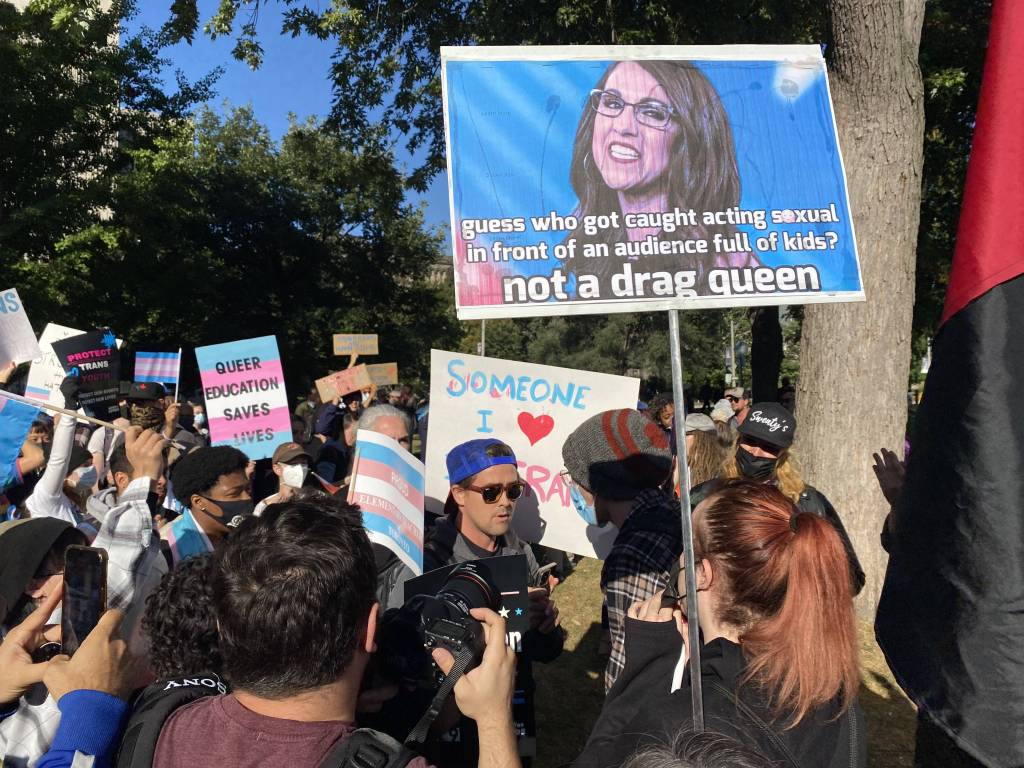A group of environmental advocates are calling out Canada’s environmental record in a series of sarcastic billboards placed in European cities.
“Dear Germany,” a half-dozen projection billboards in Berlin’s Friedrichstraße subway station said last month, “you’re famously efficient. We’re not. Good thing we’re famously apologetic. Sorry. So very sorry.”
Videos by VICE
The three-by-five-foot projection ads, which are in English, include a stylized maple-leaf seal for “The Canadian Bureau of Foreign Apologies,” and they direct readers to a satire-heavy advocacy website on which the Canadian comedian Jeremy Woodcock—under the Nom de guerre Gord Burton—apologizes for Canada’s slow progress in its protection of wildlife and ecological diversity.
Both the ads and website are sponsored by Outside Thinkers, a consortium comprising the Voila Foundation, National Environmental Treasure and the Woodcock Foundation (which has no prior relation to Mr. Woodcock outside of the biodiversity campaign, according to a spokesperson for the consortium). The group describes itself as “a collaborative working group of foundations and individuals who are committed to the environment.” The biggest funder of the group is the Woodcock Foundation, according to a group spokeswoman.
Woodcock urges Canadians to write to their Members of Parliament about the country’s commitment to set aside 17 percent of land for wildlife preservation.
The 17 percent is a reference to the Aichi Biodiversity Targets, an international set of goals taken on by nearly 200 countries in Japan in 2010. The 11th Aichi target (known in Canada as Target 1) states that by 2020, at least 17 percent of terrestrial and inland water, and 10 percent of coastal and marine areas should be protected as sanctuaries for biological diversity.
Nine years after the initiation of the Aichi targets, Canada has protected just over 11 percent of its land, according to video on the satirical site. A 2018 report by the Canadian government put that number even lower, saying that “approximately 10.5 percent of Canada’s terrestrial area (about 1 million square kilometres of land and freshwater) is formally protected by federal, provincial or territorial jurisdictions.” That puts it behind more than 100 other countries, including France, the UK, Italy, Brazil, Zambia and Equatorial Guinea. (For that last one, Woodcock deadpans “it’s gotta be around the middle somewhere,” while holding his globe.)
Woodcock declined to comment for this story.
Outside Thinkers have raised similar billboards in Greenland, St Vincent and the Grenadines, Malta and Tanzania. The advertisements were timed to coincide with Earth Day, April 22.
“Dear Greenland: We both have a reputation for freezing cold, terrifying wildlife and wide open spaces,” another billboard says. “Where we differ is that you actually protected 17 percent of your land like we both promised we would! You went all the way to 41 percent . We’ve just barely hit 11 percent. Can you put a couple of polar bears aside for us in case we need them down the road? A thousand pardons.”
“One of the key reasons why Target 1 has not been achieved is that there is virtually no public awareness about it,” said Outside Thinkers member Maxine Thomas. “Our campaign aims to change that by leveraging a particularly Canadian truth.”
“We know that Canadians are highly attuned to how we are perceived around the world. Nothing makes us feel more proud or validated than being recognized as one of the best places to live, or one of the countries with the best health care or education system,” Thomas said. “The opposite is equally true. If we receive criticism rather than praise from the international community, we believe it will generate public awareness about Target 1 in a way that simply hasn’t happened in the 9 years since we made our commitment to the global community.”
The targets—which also include goals for environmental education and policy, covering everything from sustainable agriculture to coral reef habitats—are overseen by the UN Secretariat of the Convention on Biological Diversity, which is based in Montreal. The secretariat did not respond to several requests for comment for this story. Outside Thinkers said the secretariat did not play any role in formulating and funding the campaign.
Reports on the Aichi targets have been mixed. A report by multiple bodies in 2016 had dour things to say about the state of global compliance with the targets. Two years later, in November 2018, a UN report had slightly happier news regarding Aichi target 11 — the one that required 17 percent land commitments from countries — saying most countries were likely to comply. However, a UN report released this month found that up to a million species were still at risk of extinction due to human activity. According to the 1,800-page report, most of the diversity targets agreed upon in 2010 are likely to fail.
A second campaign of online ads is about to start in additional countries.
In any case, Canada could do worse: To its south sits the United States, which is the only major country never to have ratified the relevant treaty. It therefore has no Aichi targets at all listed by the secretariat.
Follow Patrick Maynard on Twitter: @patrickmaynard




